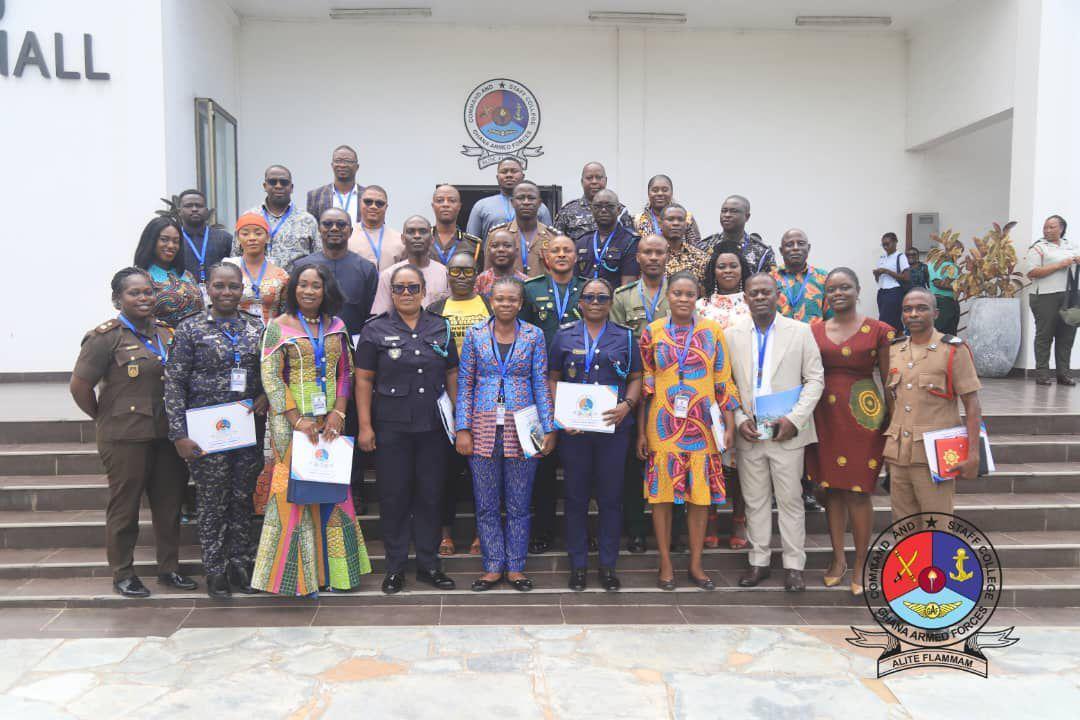Africa-Press – Ghana. Security services, civilian institutions, and policymakers have been urged to deepen collaboration in managing contemporary security threats, as defence management is no longer the preserve of the armed forces.
The call was made by the Acting Commandant of the Ghana Armed Forces College, Brigadier-General Jackson Wonjeh, at the graduation ceremony of the 2025 Defence Management Course held over the weekend in Accra.
Brig-Gen Wonjeh emphasised the increasing complexity of modern security challenges and noted that no single agency possesses all the capabilities required to address today’s multifaceted threats.
“Contemporary threats extend far beyond traditional battlefields,” he said. “They are multidimensional, transnational, and often unpredictable, ranging from insurgency and cyberattacks to environmental degradation and hybrid warfare.
“Addressing these challenges requires strategic foresight, inter-agency coordination, and prudent resource management.”
The two-week course, organised by the Staff College, brought together 135 participants from Ghana’s Ministries, Departments, and Agencies, the Security Services, and other institutions within the security sector.
It also included students from 15 African countries, as well as members of Staff College Course 46.
Brig-Gen Wonjeh explained that the course was designed to equip both military and civilian personnel with the principles, tools, and frameworks necessary to navigate the evolving security landscape effectively.
“As a college, we remain deeply committed to national development through impactful and relevant professional education,” he stated.
“This course, in particular, situates defence within the broader context of national and regional security. Success depends on how well we coordinate, share information, and plan together.”
He encouraged participants to maintain the professional networks formed during the course, describing such relationships as “invaluable to building field-level cooperation”.
“Let what you have learned here not end in the classroom,” he advised. “Apply it in your respective organisations, train others, and become multipliers of knowledge and catalysts for positive change.”
Brig-Gen. Wonjeh underlined the importance of accountability, efficiency, and innovation in defence management, reminding participants that the ultimate goal is to protect citizens and uphold the values of peace, justice, and national development.
The Course Coordinator, Lieutenant Colonel A. J. Yayu, stated that the programme was tailored for management personnel whose roles involved inter-departmental coordination.
Its objective was to expose participants to the principles, issues, and techniques essential for improving governance and management within the defence and security sectors.
The course aimed to familiarise participants with the domestic framework for managing and delivering security and defence, help civil servants and military officers understand defence within the broader national and regional context, and promote cooperation and coordination within Ghana’s security sector.
The curriculum covered three main areas: the Governance of Security and Defence, Security Issues, and Defence Management.
It was delivered through central hall lectures, plenary sessions, and syndicate exercises.
Resource persons included experts from the Ministry of Finance and Economic Planning, Ministry of Defence, the Judiciary, Ghanaian security and constitutional experts, and lecturers from academic institutions.
The course concluded with a seminar on the theme, “Building Resilient Defence.”
The 36 external participants were presented with certificates on completion of the two-week course.
Officers from the defence security services are continuing students who will complete their one-year course next month.
For More News And Analysis About Ghana Follow Africa-Press







